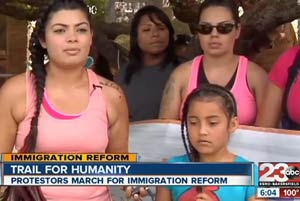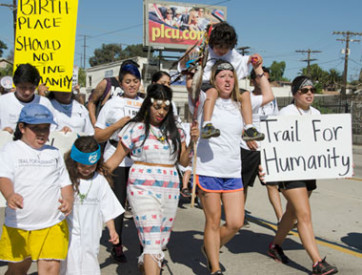After 26 days ‘in immigrant shoes,’ student mothers ponder next steps
Six UC Berkeley student mothers walked a 350-mile "Trail for Humanity" with their children this summer — calling for immigration reform as they traveled south from Merced, Calif. to the U.S.-Mexico border. The action was a way of "putting myself in those immigrant shoes," says one of the leaders, American studies major Valeska Castañeda. (Versión en español aquí)

October 3, 2014
SAN DIEGO – Valeska Castañeda spent much of her summer on a 350-mile walk to Mexico in support of immigrant rights — a trek so intense that as she started fall semester, her mind was still “throbbing,” she reports.
Después de 26 días ‘en los zapatos del inmigrante,’ madres estudiantes reflexionaron sobre sus próximos pasos 
Traducción en español
The UC Berkeley senior and five fellow student mothers left Merced in mid-July on “A Trail for Humanity,” as they named their action — threading their way south for 26 days through California’s agricultural heartland to the U.S.-Mexico border.
Braving blisters and sometimes-blistering heat, the contingent witnessed the arduous working conditions of migrant farmworkers, held noisy demonstrations outside immigrant-detention centers and shared their call for immigration reform with public officials, the media and members of the public.
Their personal encounters along the route helped start “a different conversation” — particularly with those “straddling the line,” says Castañeda, a 27-year old transfer student. “I saw the shift in their eyes.”
Nine children, aged 5 to 12, walked with them — growing before their mothers’ eyes, as she puts it, and “pumping it up” for the team when their elders tired. “They’d be like, ‘We can’t hear you! What do we want? Justice! When do we want it? Now!’ They pushed us.”
Immigrant shoes
For Castañeda, immigration is personal and the pilgrimage on foot a way of “putting myself in those immigrant shoes, the same shoes my mother and I wore when we crossed here.” In the late 1980s, her mom, then eight and a half months pregnant, fled war-torn Nicaragua for the United States, with Valeska, not yet 2, in tow. After crossing the Rio Grande into Texas they were apprehended, but were eventually granted asylum and then U.S. residency.

Vakeska Castaneda and other “marching mothers” and kids appear on local TV while passing through Bakersfield.
That personal history informed her experience of a student-led, immigration-themed alternative spring break sponsored by the UC Berkeley Public Service Center. At community organizations in Arizona, where they volunteered, Castañeda and the other Berkeley students met recent immigrants, including mothers and children, and heard accounts of punishing treks across the Sonoran desert and human-rights violations endured when immigrants were detained in the United States.
“Each day was a blow, especially as a mother,” recalls Castañeda.
Fellow American studies major Wendy Hernandez, whose family fled violence in Honduras for U.S. soil, was on that alternative spring break, too. Meeting community activists who dealt constantly with “dead bodies in the desert, and families being separated — it was very eye-opening,” she says.
Once back in the Bay Area, “moved and restless,” Castañeda wanted to take a stand, somehow, in defense of immigration reform. Other students insisted on joining her. “We jumped on board,” Hernandez says – and “A Trail for Humanity” was born.
Enthusiastic reception
The mothers walked 350 miles “nonviolently and peacefully, trying to humanize what’s been criminalized,” says Castañeda. “We gave a piece of ourselves to the Free Speech Movement that started 50 years ago. We carried on that legacy and took a piece of it on the road.”
As a safety precaution, they did not publicize their route. Yet news of their mission and whereabouts spread quickly among immigrants. “The communities would find us. ‘The marching mothers!’ They’d come with food and water and money and words,” she says.
Many supporters joined in for as long as they could. Fresno County educator Juan Sandoval and his friend Guadalupe Gutierrez, vice president of the national Mexican American Political Association, started walking with the mothers the first day and made it all the way to the end – bringing along Sandoval’s horse, Paloma, to entertain the kids with horseback rides.

Day 26, heading for the border (UC Berkeley photo by Cathy Cockrell)
The mothers are “taking action, not just a reaction,” Sandoval said admiringly. “If we had more people like them, we could change this world.”
Gabriel Vences, 59, joined his daughter — incoming transfer student Sandra Vences — for several days. “It’s been a beautiful experience, walking through the fields, knowing the struggle my dad went through” as an immigrant from Mexico in the early 1970s, Sandra said. “Seeing the farmworkers out there, the conditions they have to work through — they’ve given us hope; we’ve given them hope.”
“A Trail for Humanity” ended with an emotional ceremony at the San Ysidro border crossing, south of San Diego. Aztec dancers consecrated the moment. Children clung to the cyclone fencing and peered through to Mexico on the other side. “Marching mothers” hugged their kids and gave short speeches as they choked back tears.
Already, says Castañeda, requests were pouring in via email and voicemail: “‘Are you going to do this again next summer? Where do I sign up? Will you walk through Texas? Oregon? Costa Rica?’… I’m reflecting and meditating on what comes next.”